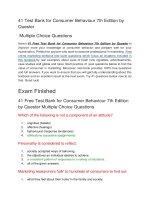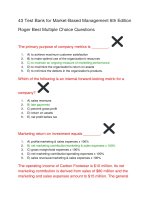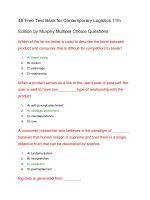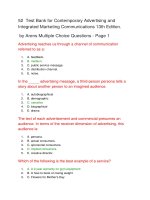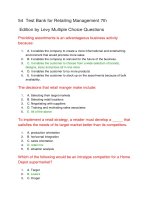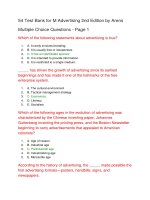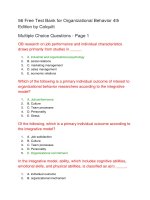40 free test bank with answers for marketing management 1st
Bạn đang xem bản rút gọn của tài liệu. Xem và tải ngay bản đầy đủ của tài liệu tại đây (50.22 KB, 16 trang )
40 Free Test Bank for Marketing Management 1st
Edition by Iacobucci Multiple Choice Questions
What is one of the largest factors stressing out marketers these
days?
1.
2.
3.
4.
a. the pressure increase stock price
b. the pressure to prove they are valuable
c. the pressure to show results
d. the pressure to produce more money than R&D
Fundamentally, the best marketers put themselves in the place of
their _____.
1.
2.
3.
4.
a. company
b. customers
c. competitors
d. friends
One reason marketers want to quantify how effective their programs
are is to show that they increase profits. The other reason
marketers want to quantify their effectiveness is to _____.
1.
2.
3.
4.
a. try to raise their rank among the function
b. have a seat at the table with the CEO, CFO, etc.
c. be able to direct sales
d. make more effective promotions
What can be marketed?
1.
2.
3.
4.
a. vacation destinations
b. professional athletes
c. just about anything
d. clothes
Due to marketing’s success in business, what do management guru
s think about marketing’s role in a company?
1.
2.
3.
4.
a. they think its role is to direct sales
b. it takes no special skill to be a good marketer anymore
c. that it’s not just a function anymore
d. it’s the most important aspect
Which of the following is defined to be an exchange between a firm
and its customers?
1.
2.
a. advertising
b. consumer behavior
3.
4.
c. marketing
d. finance
Marketing can make customers happier, which makes companies
____.
1.
2.
3.
4.
a. more profitable
b. less vulnerable
c. more operational
d. more ductile
The question, “Will customers want what your company is prepared
to produce?,” best describes with of these 4Ps?
1.
2.
3.
4.
a. product
b. price
c. place
d. promotion
Marketing is thought to be evidence of an evolved ____.
1.
2.
3.
4.
a. society
b. business
c. customer
d. market
Marketers help/work with all of the following EXCEPT:
1.
2.
3.
4.
a. athletes
b. hotels
c. department stores
d. pets
Advertising's goal is to enhance _____.
1.
2.
3.
4.
a. brand image
b. profit
c. marketing
d. purchases
Great marketing is based on ______ laws of human and
organization behavior.
1.
2.
3.
4.
a. philosophical
b. feelings about
c. intuitive
d. economic and psychological
Which of the following is NOT part of the 5Cs?
1.
2.
a. context
b. customer
3.
4.
c. corporation
d. competitors
The textbook uses the ____ over and over so that you will pick it up
by osmosis.
1.
2.
3.
4.
a. marketing background
b. customer model
c. 5Cs, STP, and 4Ps
d. Maslow model
In each chapter you will see _____ over and over again
1.
2.
3.
4.
a. consequentialism ethics
b. marketing terminology
c. the 5Cs, STP, and 4Ps
d. marketing concepts
The marketing framework can be used when you’re ____.
1.
2.
3.
4.
a. buying a car
b. working on a case for class
c. trying to decide where to eat lunch
d. doing your taxes
The book gives a clear knowledge of marketing at both the strategic
and conceptual level as well as the ____.
1.
2.
3.
4.
a. virtual level
b. tactical, hands-on level
c. lower level
d. psychological level
The outcome orientation perspective of ethics is called ____.
1.
2.
3.
4.
a. psychological
b. philosophical
c. deontological
d. consequentialism
What is today’s marketplace focused more on?
1.
2.
3.
4.
a. business
b. customers
c. product
d. price
Great marketing is NOT ____.
1.
2.
3.
a. soft
b. economic
c. logical
4.
d. psychological
What is marketing NOT all about?
1.
2.
3.
4.
a. finding out what customers like
b. providing what customers like
c. making a profit
d. organizing the structure of a business
The 4Ps include all of the following EXCEPT:
1.
2.
3.
4.
a. positioning
b. price
c. product
d. place
Which of the following is NOT a part of STP?
1.
2.
3.
4.
a. segmentation
b. positioning
c. targeting
d. All are part of STP
What order is correct for the marketing framework?
1.
2.
3.
4.
a. 5Cs, 4Ps, STP
b. 4Ps, 5Cs, STP
c. 5Cs, STP, 4Ps
d. STP, 5Cs, 4Ps
Marketers try to figure out what __________ want and then they try
to figure out how to provide it and make money doing so.
1.
2.
3.
4.
a. business owners
b. customers
c. advertisers
d. companies
The process orientation perspective of ethics is called ____.
1.
2.
3.
4.
a. psychological
b. philosophical
c. deontological
d. consequentialism
The textbook will assume that _____ will be used for data intake in
a company.
1.
2.
3.
4.
a. experts
b. the Internet
c. polls
d. focus groups
What did the early marketplace primarily focus on?
1.
2.
3.
4.
a. product
b. promotion
c. price
d. place
Why do accounting and finance need to acknowledge the
importance of marketing?
1.
2.
3.
4.
a. because marketing generates sales
b. because the CEOs do
c. because marketing generates buzz
d. because a monopoly is the only way to make a profit
_____ and _____ are the central players in the marketing
exchange.
1.
2.
3.
4.
a. Context, customer
b. Collaborator, competitor
c. Context, company
d. Customer, company
A company’s marketing executives should assess the _____ in term
s of a general analysis of a business problem or opportunity the
company is facing.
1.
2.
3.
4.
a. business situation
b. 5Cs
c. STP
d. ARA
What do the letters CMO represent?
1.
2.
3.
4.
a. Chief Management Officer
b. Central Marketing Organization
c. Central Management Officer
d. Chief Marketing Officer
Each chapter in the textbook answers what question?
1.
2.
3.
4.
a. Which of the 5Cs is covered in this chapter?
b. What is the topic in this chapter?
c. What makes a great marketer?
d. What do you need to do to market your own business?
A company has its best chance at keeping its customers happy if it’
s in close ____ with them.
1.
2.
a. context
b. communication
3.
4.
c. cooperation
d. support
The questions and issues that the reader can expect to understand
better in each chapter is revisited at the end of the chapter in a list
format called _____.
1.
2.
3.
4.
a. Managerial Recap
b. Managerial Checklist
c. Question Recap
d. Marketing Recap
If you ask the average person, “What is marketing?,” one of the thin
gs you might hear is:
1.
2.
3.
4.
a. Marketing is sales and advertising
b. Marketing is fun
c. Marketing is the backbone of all business
d. Marking is not profitable
What is the result companies see from happier customers due to
marketing?
1.
2.
3.
4.
a. Companies are less profitable
b. Companies market less
c. Companies are more profitable
d. Companies see no results
If companies are good and if they’re lucky, the exchange continues i
terating between the customer and the company, ___________ the
tie between them.
1.
2.
3.
4.
a. strengthening
b. weakening
c. distracting
d. exhausting
What is the best way to stay 5 steps ahead of the competition?
1.
2.
3.
4.
a. focus on profits
b. remain customer centric
c. focus on what the CEO wants
d. study the competition
Which of the following is NOT a question that each chapter in the
textbook answers?
1.
2.
3.
a. Why does it matter?
b. What is the topic in this chapter?
c. How do I do this?
4.
d. What do you need to do to market your own business?
47 Free Test Bank for SELL 4th Edition by Ingram
Multiple Choice Questions
Which of the following is most accurate with respect to buyers’
expectations of salespeople?
1.
2.
3.
4.
5.
a.Buyers expect salespeople to be self-serving.
b.Buyers expect salespeople to be driven solely by profit.
c.Ultimately, buyers have little to no expectations of salespeople.
d.Buyers expect sales people to contribute to the success of the buyer’s firm
e.All of the above are accurate.
Need-satisfaction personal selling is based on the idea that:
1.
2.
3.
a.Customers need to be told what they want.
b.The customer needs to know what products the firm offers.
c.Salespeople should be friendly because customers need to feel that they
are appreciated.
4. d.Customers purchase to satisfy a particular need or set of needs.
5. e.Customers have only one need at a time and it must be met before the
salesperson can interest them in any other product.
According to the text, salespeople contribute to their firms in each of
the following ways except?
1.
2.
3.
4.
5.
a.Maximizing customer count
b.Helping with market research
c.Generating revenue
d.Becoming leaders in the future
e.Each of the above is correct
Salespeople have the following relationship with revenue in most
business firms:
1.
2.
3.
4.
5.
a.Indirect.
b.Direct.
c.No relationship.
d.Parallel.
e.Inverse.
Susan’s customers are always concerned about what they’re
receiving in exchange for what they’re paying. In other words, they
are concerned about _______________.
1.
2.
3.
a.Marketing
b.Personal selling
c.Customer value
4.
5.
d.Marketing Communications
e.Advertising
Salespeople have contributed to the economic growth of the United
States in two basic ways:
1.
2.
3.
4.
5.
a.By stimulating economic transactions and encouraging research and
development.
b.By bringing producers news about the state of the market and introducing
new products to people in rural areas.
c.By stabilizing economic transactions and assisting in recovery cycles.
d.By sustaining periods of relative prosperity and developing product
awareness among consumers.
e.By stimulating economic transactions and increasing the diffusion of
innovation.
According to the text, in considering the responsibility for revenue
production, salespeople usually feel the brunt of the pressure along
with:
1.
2.
3.
4.
5.
a.The firm's stockholders.
b.The firm's production staff.
c.The firm's management staff.
d.The firm's financial staff.
e.The customer service supervisor.
The most important part of marketing communications for most
business firms is:
1.
2.
3.
4.
5.
a.Personal selling.
b.Advertising.
c.Public relations.
d.Sales promotions.
e.Publicity.
Continued affirmation selling is:
1.
2.
3.
a.The primary sales method utilized by professional salespeople
b.The same thing as Adaptive Selling
c.A sales presentation that is unplanned and developed in response to the
needs of the customer
4. d.A sales presentation unrelated to stimulus response selling
5. e.An example of stimulus response selling
The problem-solving view of personal selling is an extension of:
1.
2.
3.
4.
a.Needs-satisfaction selling.
b.Stimulus-response selling.
c.Contingency selling.
d.Mental-states selling.
5.
e.Problem-solution selling.
Which of the following is not a typical skill required for trust-based
relationship selling?
1.
2.
3.
4.
5.
a.Financial planning
b.Information gathering
c.Listening and questioning
d.Strategic problem solving
e.Team building and teamwork
The mental-states, or formula approach, to personal selling
assumes that buyers must be led through four mental states, which
occur in this order:
1.
2.
3.
4.
5.
a.Interest, attention, desire, action.
b.Attention, desire, interest, action.
c.Curiosity, interest, conviction, purchase.
d.Attention, interest, desire, action.
e.Listening, considering, aspiring, deciding.
As the evolution of personal selling continues, which of the following
is not a predicted sales force response to an expected change?
1.
2.
3.
4.
5.
a.More emphasis will be placed on developing and maintaining trust-based
long-term customer relationships.
b.Greater emphasis will be placed on team selling.
c.There will be an increase in the use of technology (e.g., laptop computers,
electronic mail, and fax machines).
d.More sales dollars will be spent on advertising.
e.There will be an increase in the globalization of sales efforts.
Sales _____________ is a customer-oriented approach that uses
truthful, non-manipulative tactics to satisfy the long-term needs of
both the customer and the selling firm.
1.
2.
3.
4.
5.
a.Dialogue
b.Pitching
c.Communication
d.Professionalism
e.Engagement
David is always willing to support his customers even when an
immediate sale is not expected. David is perceived by his
customers as a _____________________ one of the roles David
plays as a consultative salesperson.
1.
2.
a.Strategic orchestrator
b.Business consultant
3.
4.
5.
c.Long-term ally
d.Business partner
e.Strategic innovator
While accountants and financial staff are concerned with profitability
in ____ terms, salespeople are primarily concerned with profitability
in ____ terms.
1.
2.
3.
4.
5.
a.Top-line, bottom-line
b.Accounting, sales
c.Profit/loss, revenue
d.Cost-of-production, cost-of-sales
e.Bottom-line, top-line
Customers perceptions of what they get for what they have to give
up is referred to as Customer __________
1.
2.
3.
4.
5.
a.Benefits
b.Cost
c.Behavior
d.Engagement
e.None of the above are correct
Which of the roles salespeople play in consultative selling is most
dependent upon the salesperson’s business, industry, and customer
knowledge?
1.
2.
3.
4.
5.
a.Strategic orchestrator
b.Business consultant
c.Long-term ally
d.Business partner
e.Strategic innovator
_________________is the role the salesperson plays in
consultative selling were he or she arranges the use of the sales
organization’s resources in an effort to satisfy the customer.
1.
2.
3.
4.
5.
a.Strategic orchestrator
b.Business consultant
c.Long-term ally
d.Business partner
e.Strategic innovator
The sales process is usually described as a series of ____ steps.
1.
2.
3.
4.
a.Ten
b.Cumulative
c.Interrelated
d.Separate but equal
5.
e.Different
Kevin is a salesperson who relies heavily on trust building. This
style of selling is known as?
1.
2.
3.
4.
5.
a.Personal selling
b.Mental states selling
c.Trust-Based relationship selling
d.Canned selling
e.None of the above.
The part of marketing that relies heavily on interpersonal
communication and interaction between buyers and sellers is called
_____________
1.
2.
3.
4.
5.
a.Advertising
b.Sales promotion
c.Direct marketing
d.Consumer behavior
e.Personal selling
A personal selling approach that involves helping customers reach
their strategic goals by using the products, services and expertise of
the sales organization is called:
1.
2.
3.
4.
5.
a.Needs-satisfaction selling.
b.Consultative selling.
c.Alternative-solutions approach.
d.Stimulus-response selling.
e.Adaptable response method.
As a salesperson, you are expected to:
1.
2.
3.
4.
5.
a.Get to know the buyers on a personal level.
b.Contribute to the success of the buyer's firm.
c.Serve your employer's interests only.
d.Only be concerned with meeting your sales quota.
e.Not get involved with your customers' problems.
Which of the five views of personal selling is considered to be the
simplest?
1.
2.
3.
4.
5.
a.Stimulus-response
b.Need-satisfaction
c.Contingency-selling
d.Mental-states
e.Problem-solution
Which of the following statements pertaining to the stimulusresponse form of personal selling is true?
1.
2.
a.The buyer takes a dominant role in the sales dialogue.
b.The stimulus-response sales strategy cannot be used with a canned sales
presentation.
3. c.The stimulus-response sales strategy must be conducted in person because
of the necessity for visual aids.
4. d.An example of the stimulus-response sales strategy would be the continued
affirmation method.
5. e.The stimulus-response sales strategy has the advantage of flexibility.
Which of the following is not part of the Trust-Based Sales Process
model outlined in the text?
1.
2.
3.
4.
5.
a.Selling Foundations
b.Selling situation
c.Initiating customer relationships
d.Developing customer relationships
e.Enhancing customer relationships
Which of the following is most accurate with respect to post sale
follow-up?
1.
2.
3.
4.
5.
a.Transaction-focused selling includes substantial follow-up.
b.Transaction-focus selling includes little to no follow-up.
c.Trust-based relationship selling involves substantial follow-up.
d.Trust-based relationship selling it involves little to no follow-up.
e.Both B and C are correct.
The most important part of the salesperson's job is:
1.
2.
3.
4.
5.
a.Tracking accounts receivable.
b.The sales process.
c.Training new salespersons.
d.Maintaining their credibility and integrity.
e.Attending training sessions.
The primary focus of transaction-focused selling is the
________________________.
1.
2.
3.
4.
5.
a.Salesperson and the selling organization
b.Customer
c.Product
d.Communication process
e.All of the above.
Advantages of most sales jobs include all of the following except?
1.
2.
3.
4.
a.Job variety
b.Advancement opportunities
c.Immediate feedback
d.Regular vacations
5.
e.Each of the above is correct
One of the key roles that salespeople client in society is the
distribution of knowledge about new technology. In other words,
salespeople helped with the __________________________.
1.
2.
3.
4.
5.
a.Growth of revenue
b.Diffusion of innovation
c.Market research process
d.Distribution of products
e.None of the above.
Kim is proud to be a salesperson because she knows she is
benefiting society by helping to __________ and promote the
____________
1.
2.
3.
4.
5.
a.Stimulate the economy; diffusion of innovation
b.Add value; welfare of the company for which she works
c.Uncover needs; solutions
d.Sell products; company’s brands
e.Sell products; development of her customers
Ethan is engage in sales __________ , which refers to a series of
conversations between buyers and sellers that occur as
salespeople attempt to initiate, develop, and enhance customer
relationships
1.
2.
3.
4.
5.
a.Training
b.Dialogue
c.Calling
d.Pitching
e.Both C and D are correct
The sales process begins with:
1.
2.
3.
4.
5.
a.The training of the sales force.
b.Locating qualified prospective customers.
c.Planning the sales presentation.
d.The completion of the sale.
e.Making an appointment to see the customer.
In which of the following types of sales positions is a
pharmaceutical industry representative likely to be found?
1.
2.
3.
4.
5.
a.Detailer
b.Retailer
c.Pioneer
d.Order-getter
e.Order-taker
When practicing trust-based relationship selling, salespeople should
do all of the following except:
1.
2.
3.
4.
5.
a.Act as a business consultant and long-term ally.
b.Participate in two-way and collaborative communication.
c.Practice stimulus-response selling.
d.Be actively involved in the customer's decision making process.
e.Provide continued follow-through.
Which of the following is not one of the four basic approaches to
personal selling that were identified three decades ago?
1.
2.
3.
4.
5.
a.Stimulus-response
b.Need-satisfaction
c.Contingency-selling
d.Mental-states
e.Problem-solution
All of the following statements accurately reflect factors that pertain
to need-satisfaction selling except?
1.
2.
a.This method focuses on the salesperson and his/her product offerings.
b.The salesperson utilizes questioning, probing tactics to uncover important
buyer needs.
3. c.The salesperson waits until relevant needs have been established before
discussing product offerings.
4. d.The customer dominates the early portion of the sales interaction.
5. e.It is the salesperson's duty to identify the need to be met and then help the
buyer in meeting that need.
The series of conversations between buyers and Sellers that take
place over time in an attempt to build relationships is referred to as
_____________.
1.
2.
3.
4.
5.
a.Advertising
b.Sales dialogue
c.Sales presentation
d.Sales communication
e.Sales conversation
Jennifer follows the trust-based relationship selling strategy when
dealing with her customers. She can expect to be
________________ her customers’ decision-making processes.
1.
2.
3.
4.
5.
a.Isolated from
b.Actively involved in
c.Dissatisfied with
d.Uncertain about
e.None of the above are correct.
Natalie is a college graduate seeking a job that will allow here to
interact with customers individually. She is looking for a job in
_______________.
1.
2.
3.
4.
5.
a.Advertising
b.Sales promotion
c.Direct marketing
d.Personal selling
e.Management
Which one of the following is not a stage in the problem-solving
approach to selling?
1.
2.
3.
4.
5.
a.Continue selling until purchase decision.
b.Generate alternative solutions.
c.Follow up sale with additional product offerings.
d.Define problem.
e.Evaluate alternative solutions.
According to the text, when salespeople alter their sales messages
and behaviors during a sales presentation, or as they encounter
different sales situations, they are using:
1.
2.
3.
4.
5.
a.Value-based selling.
b.Response selling.
c.Interactive selling.
d.Adaptive selling.
e.Situational selling.
The desired outcomes in trust-based relationship selling include
which of the following?
1.
2.
3.
4.
5.
a.Closed sales
b.Order volume
c.Trust, mutual benefits, and enhanced profits
d.Profit in the short-term
e.None of the above.
Salespeople who are customer oriented, honest, dependable,
competent, and likable are in a good position to establish
1.
2.
3.
4.
5.
a.Rapport.
b.Trust.
c.Commitment.
d.Customer feedback.
e.Source credibility.
Which of the following is not a class of sales job?
1.
2.
3.
4.
5.
a.Sales support
b.New business
c.Territory manager
d.Inside
e.Direct-to-consumer


